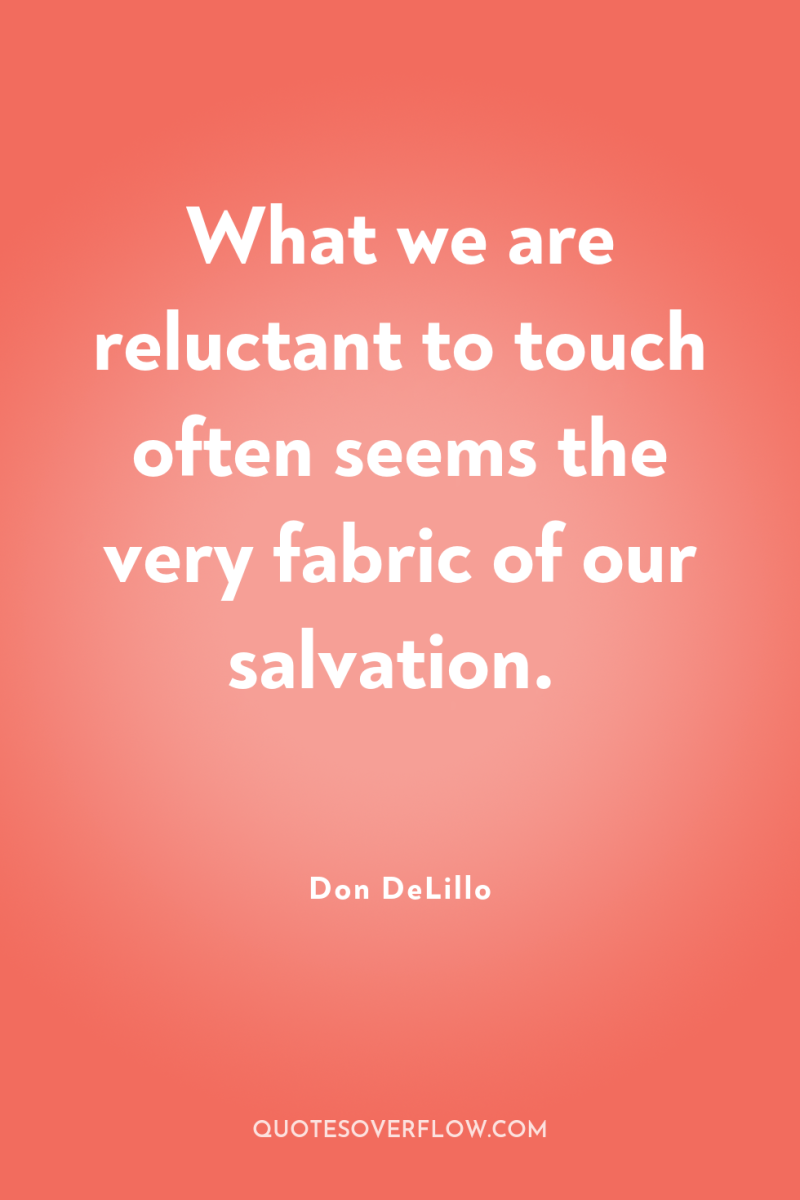
1
What we are reluctant to touch often seems the very fabric of our salvation.Don DeLillo
2
It was only after two years' work that it occurred to me that I was a writer. I had no particular expectation that the novel would ever be published, because it was sort of a mess. It was only when I found myself writing things I didn't realise I knew that I said, 'I'm a writer now.' The novel had become an incentive to deeper thinking. That's really what writing is–an intense form of thought.Don DeLillo
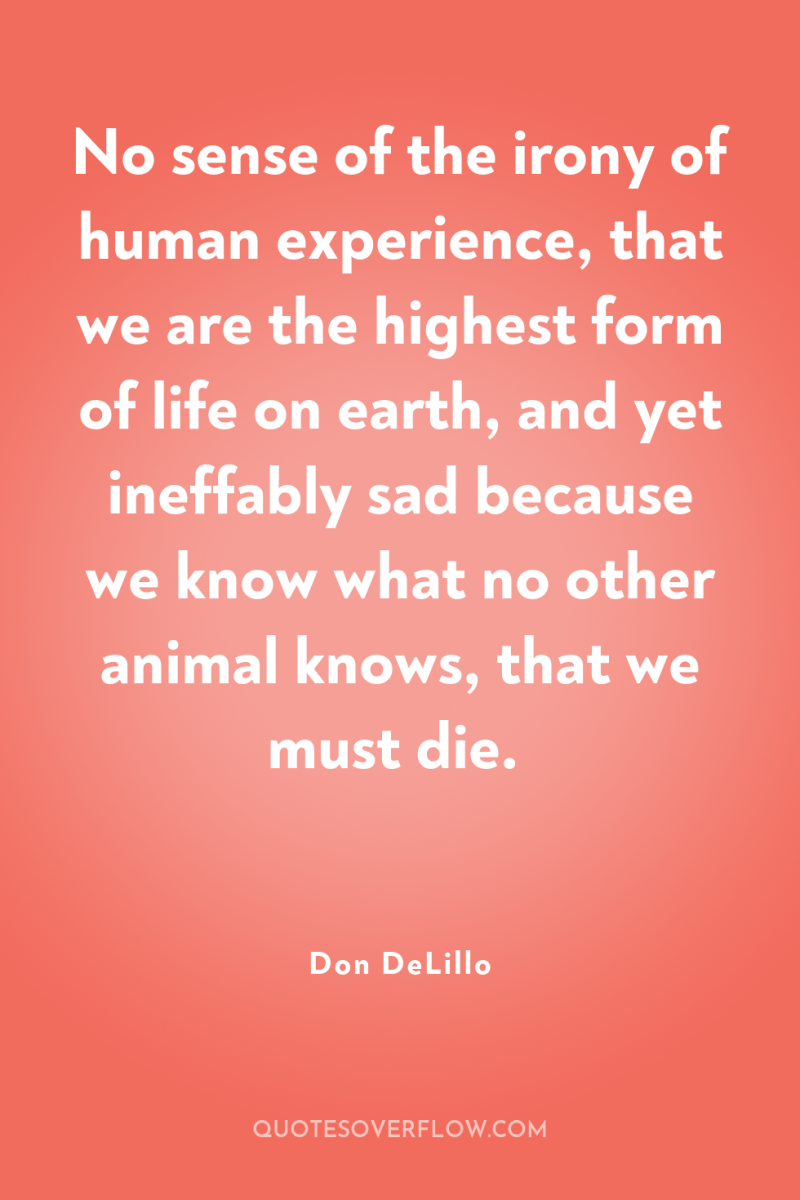
3
No sense of the irony of human experience, that we are the highest form of life on earth, and yet ineffably sad because we know what no other animal knows, that we must die.Don DeLillo
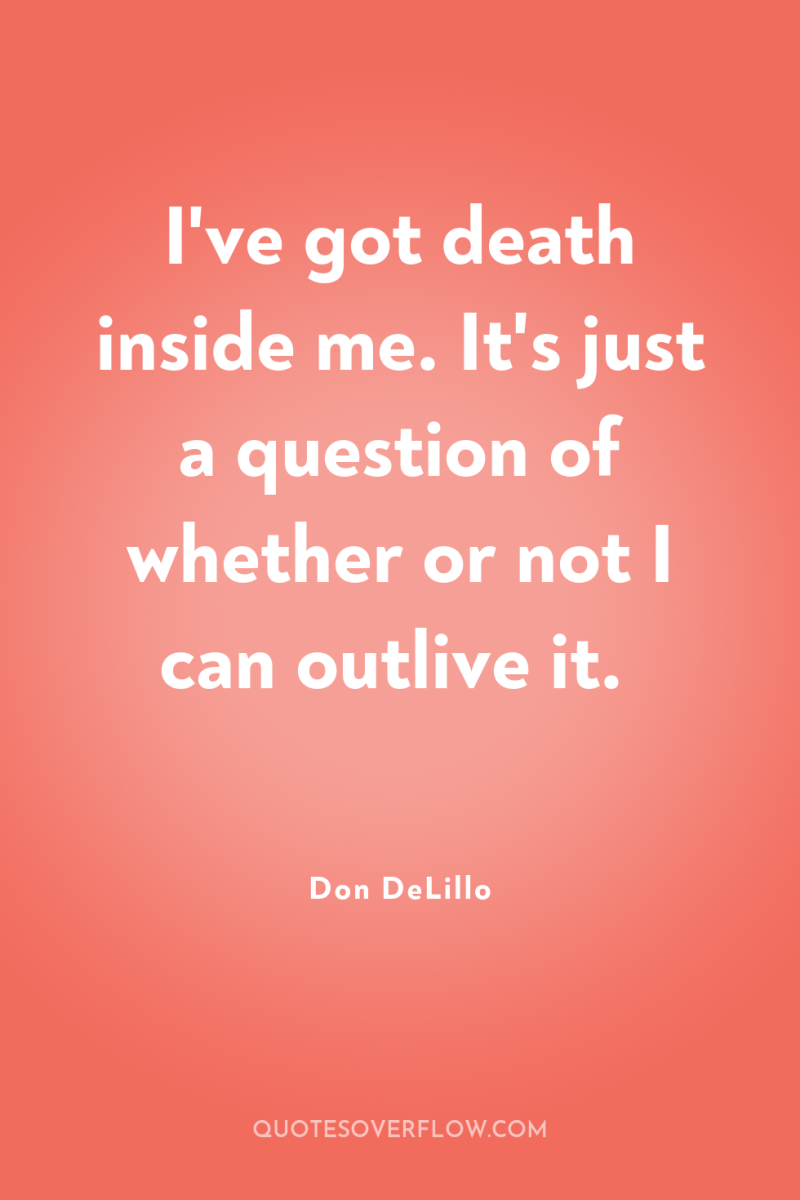
4
I've got death inside me. It's just a question of whether or not I can outlive it.Don DeLillo
5
The power of the dead is that we think they see us all the time. The dead have a presence. Is there a level of energy composed solely of the dead? They are also in the ground, of course, asleep and crumbling. Perhaps we are what they dream.Don DeLillo
6
When I read obituaries I always note the age of the deceased. Automatically I relate this figure to my own age. Four years to go, I think. Nine more years. Two years and I'm dead. The power of numbers is never more evident than when we use them to speculate on the time of our dying.Don DeLillo
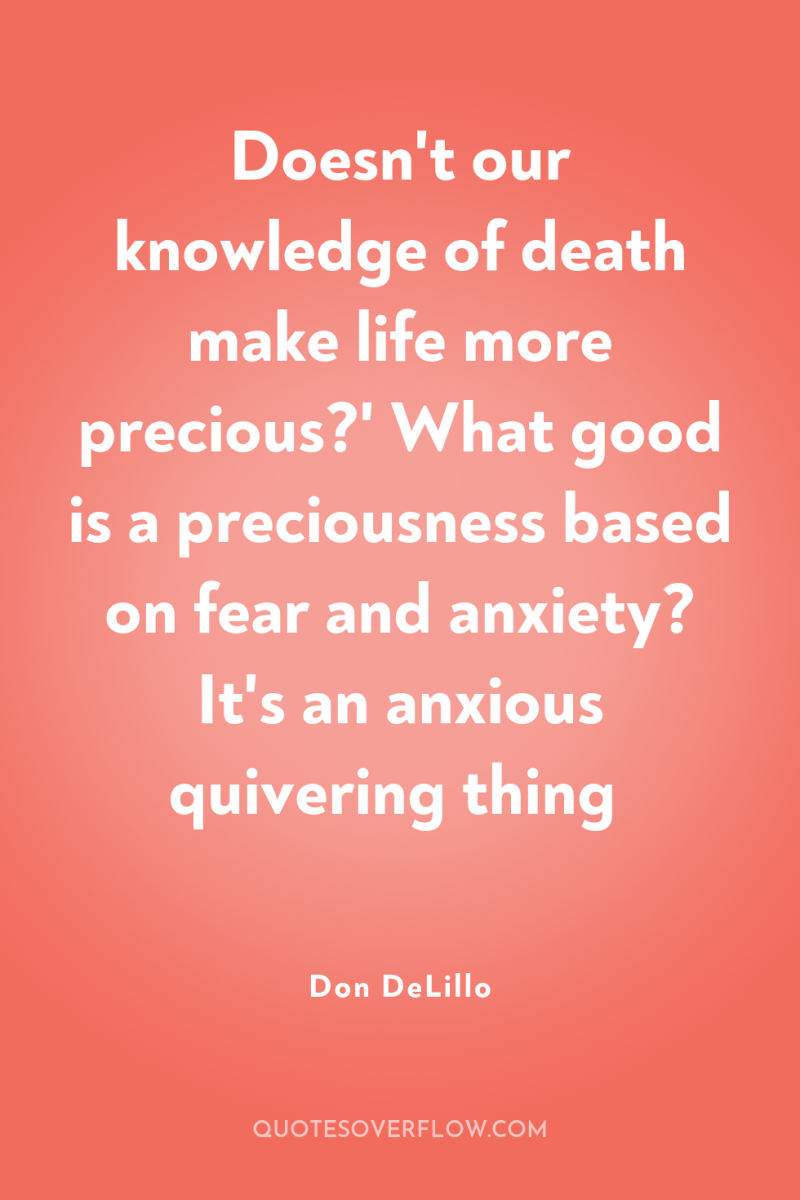
7
Doesn't our knowledge of death make life more precious?' What good is a preciousness based on fear and anxiety? It's an anxious quivering thingDon DeLillo
8
Supermarkets this large and clean and modern are a revelation to me. I spent my life in small steamy delicatessens with slanted display cabinets full of trays that hold soft wet lumpy matter in pale colours. High enough cabinets so you had to stand on tiptoes to give your order. Shouts, accents. In cities no one notices specific dying. Dying is a quality of the air. It's everywhere and nowhere. Men shout as they die to be noticed, remembered for a second or two. To die in an apartment instead of a house can depress the soul, I would imagine, for several lives to come. In a town there are houses, plants in bay windows. People notice dying better. The dead have faces, automobiles. If you don't know a name you know a street name, a dog's name. 'He drove an orange Mazda.' You know a couple of useless things about a person that become major facts of identification and cosmic placement when he dies suddenly, after a short illness, in his own bed, with a comforter and matching pillows, on a rainy Wednesday afternoon, feverish, a little congested in the sinuses and chest, thinking about his dry cleaning.Don DeLillo
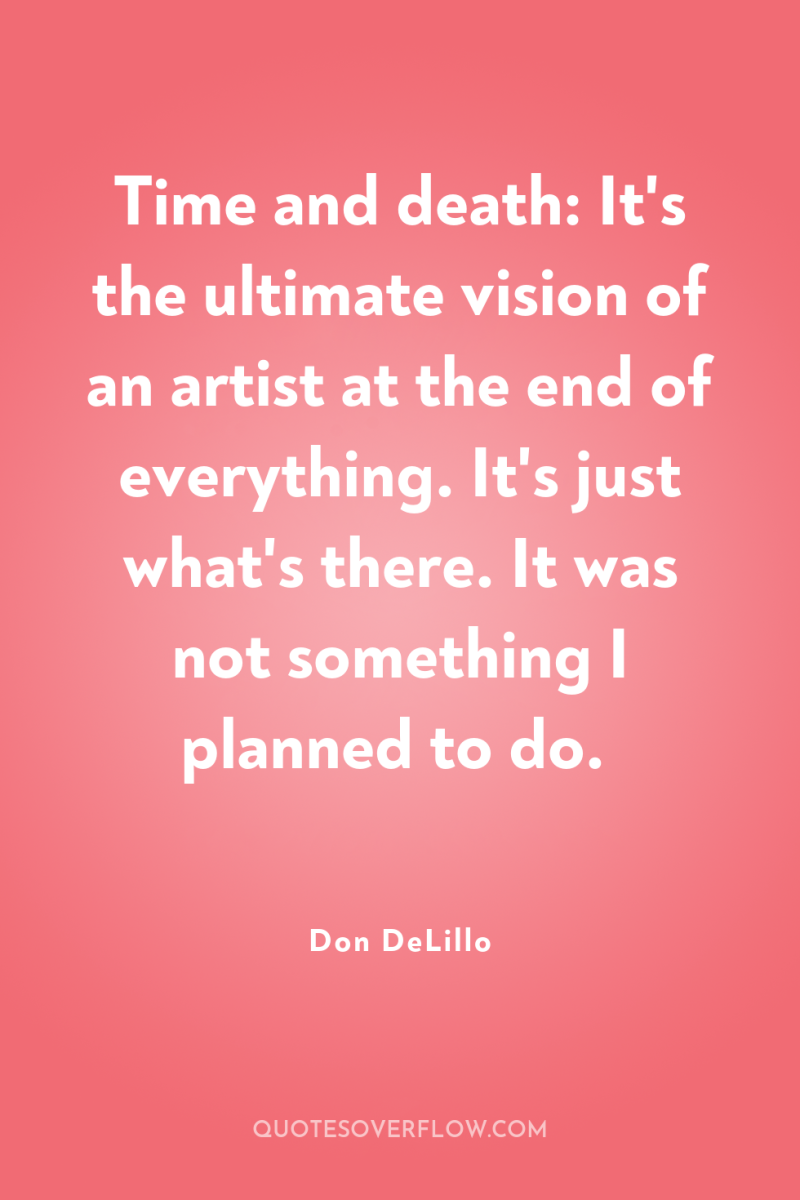
9
Time and death: It's the ultimate vision of an artist at the end of everything. It's just what's there. It was not something I planned to do.Don DeLillo
10
The plane had lost power in all three engines, dropped from thirty-four thousand feet to twelve thousand feet. Something like four miles. When the steep glide began, people rose, fell, collided, swam in their seats. Then the serious screaming and moaning began. Almost immediately a voice from the flight deck was heard on the intercom: "We're falling out of the sky! We're going down! We're a silver gleaming death machine! " This outburst struck the passengers as an all but total breakdown of authority, competence and command presence and it brought on a round of fresh and desperate wailing.Don DeLillo
11
Writing is a concentrated form of thinking...a young writer sees that with words he can place himself more clearly into the world. Words on a page, that's all it takes to help him separate himself from the forces around him, streets and people and pressures and feelings. He learns to think about these things, to ride his own sentences into new perceptions.Don DeLillo
12
When I work, I'm just translating the world around me in what seems to be straightforward terms. For my readers, this is sometimes a vision that's not familiar. But I'm not trying to manipulate reality. This is just what I see and hear.Don DeLillo

13
The true life is not reducible to words spoken or written, not by anyone, ever.Don DeLillo
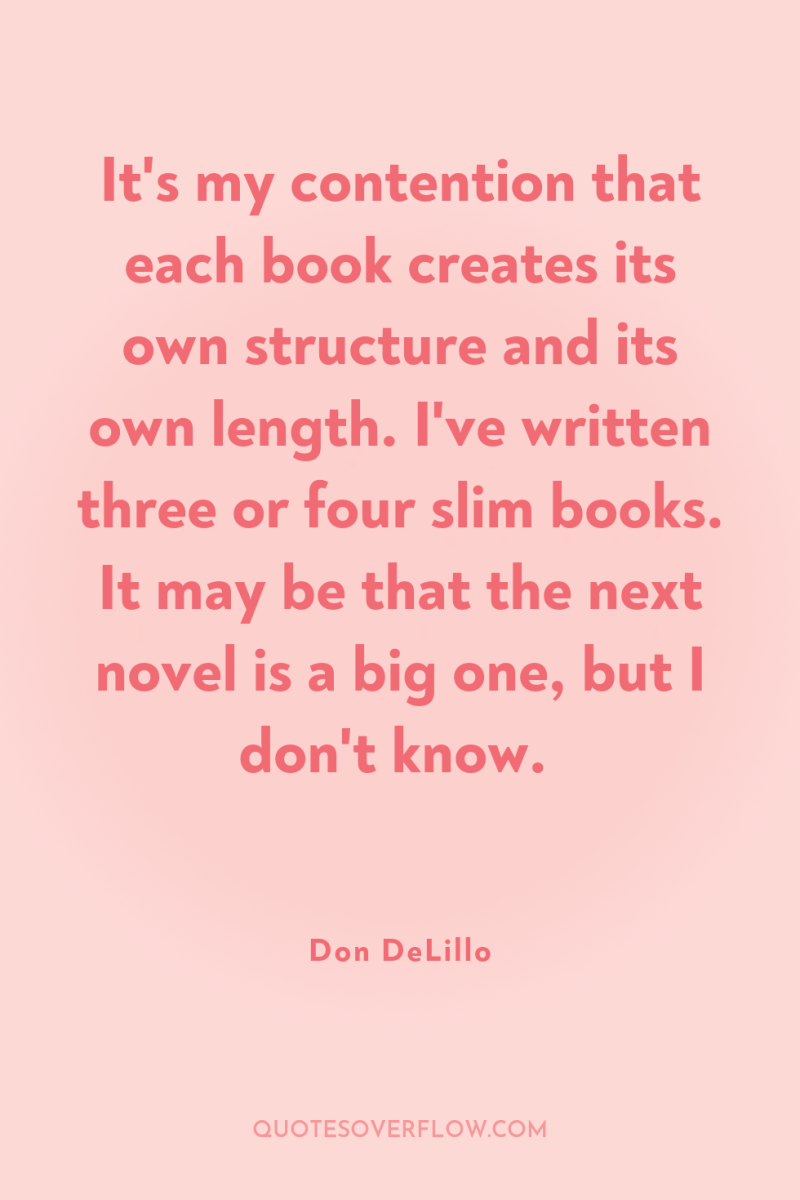
14
It's my contention that each book creates its own structure and its own length. I've written three or four slim books. It may be that the next novel is a big one, but I don't know.Don DeLillo
15
Those who have abandoned belief must still believe in us. They are sure that they are right not to believe but they know belief must not fade completely. Hell is when no one believes. There must always be believers. Fools, idiots, those who hear voices, those who speak in tongues. We are your lunatics. We surrender our lives to make your nonbelief possible. You are sure that you are right but you don’t want everyone to think as you do. There is no truth without fools. We are your fools, your madwomen, rising at dawn to pray, lighting candles, asking statues for good health, long life. .Don DeLillo
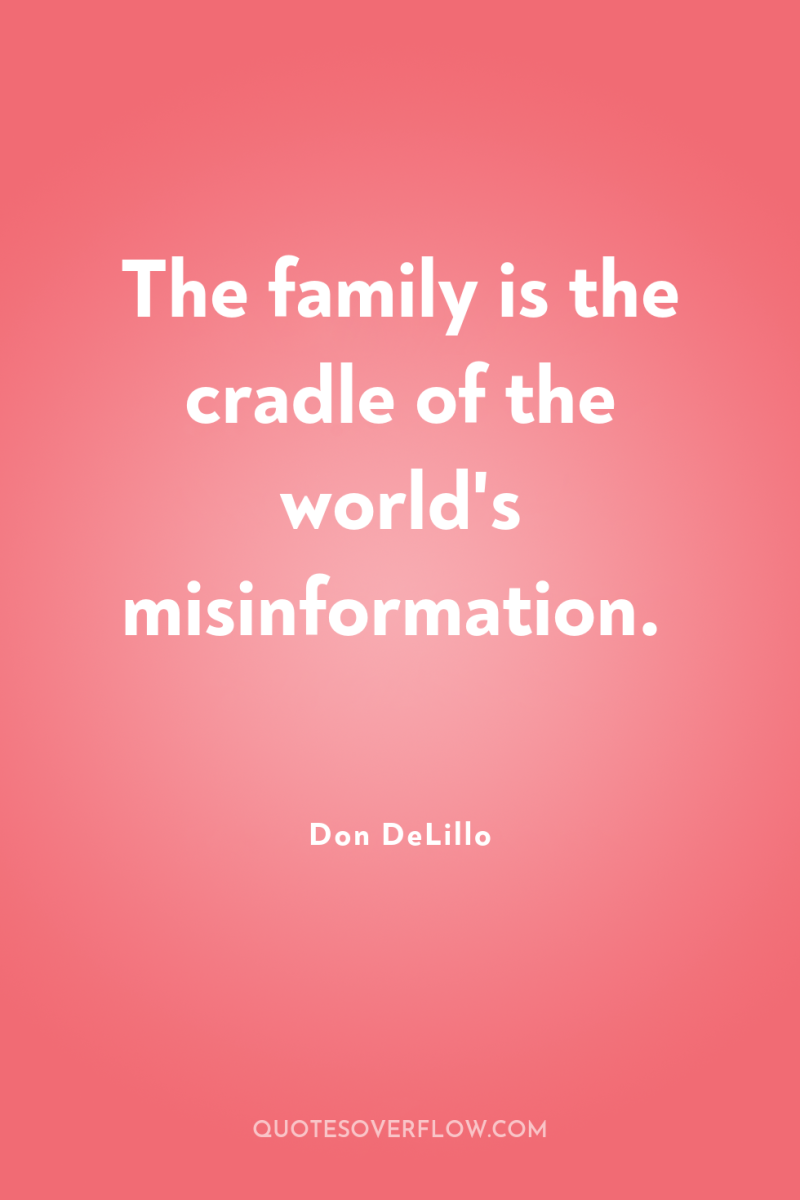
16
The family is the cradle of the world's misinformation.Don DeLillo
17
Within sixty-minute limits or one-hundred-yard limits or the limits of a game board, we can look for perfect moments or perfect structures. In my fiction I think this search sometimes turns out to be a cruel delusion. No optimism, no pessimism. No homesickness for lost values or for the way fiction used to be written. Everybody seems to know everything. Subjects surface and are totally exhausted in a matter of days or weeks, totally played out by the publishing industry and the broadcast industry. Nothing is too arcane to escape the treatment, the process. Making things difficult for the reader is less an attack on the reader than it is on the age and its facile knowledge-market. The writer is the person who stands outside society, independent of affiliation and independent of influence. The writer is the man or woman who automatically takes a stance against his or her government. There are so many temptations for American writers to become part of the system and part of the structure that now, more than ever, we have to resist. American writers ought to stand and live in the margins, and be more dangerous. Writers in repressive societies are considered dangerous. That’s why so many of them are in jail. Some people prefer to believe in conspiracy because they are made anxious by random acts. Believing in conspiracy is almost comforting because, in a sense, a conspiracy is a story we tell each other to ward off the dread of chaotic and random acts. Conspiracy offers coherence. I see contemporary violence as a kind of sardonic response to the promise of consumer fulfillment in America.. I see this desperation against the backdrop of brightly colored packages and products and consumer happiness and every promise that American life makes day by day and minute by minute everywhere we go. Discarded pages mark the physical dimensions of a writer’s labor. Film allows us to examine ourselves in ways earlier societies could not–examine ourselves, imitate ourselves, extend ourselves, reshape our reality. It permeates our lives, this double vision, and also detaches us, turns some of us into actors doing walk-throughs. Every new novel stretches the term of the contract–let me live long enough to do one more book. You become a serious novelist by living long enough.Don DeLillo
18
How strange it is. We have these deep terrible lingering fears about ourselves and the people we love. Yet we walk around, talk to people, eat and drink. We manage to function. The feelings are deep and real. Shouldn't they paralyze us? How is it we can survive them, at least for a little while? We drive a car, we teach a class. How is it no one sees how deeply afraid we were, last night, this morning? Is it something we all hide from each other, by mutual consent? Or do we share the same secret without knowing it? Wear the same disguise?.Don DeLillo

19
Fear is self-awareness raised to a higher level.Don DeLillo
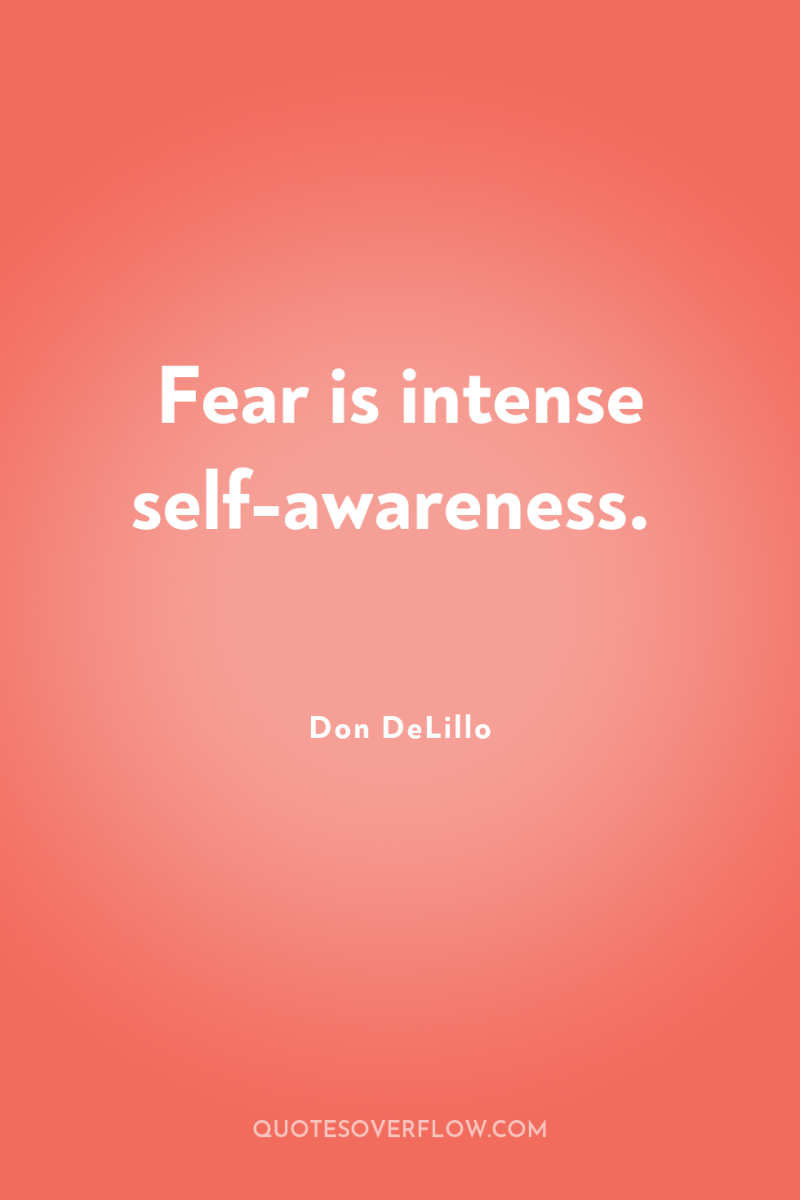
20
Fear is intense self-awareness.Don DeLillo
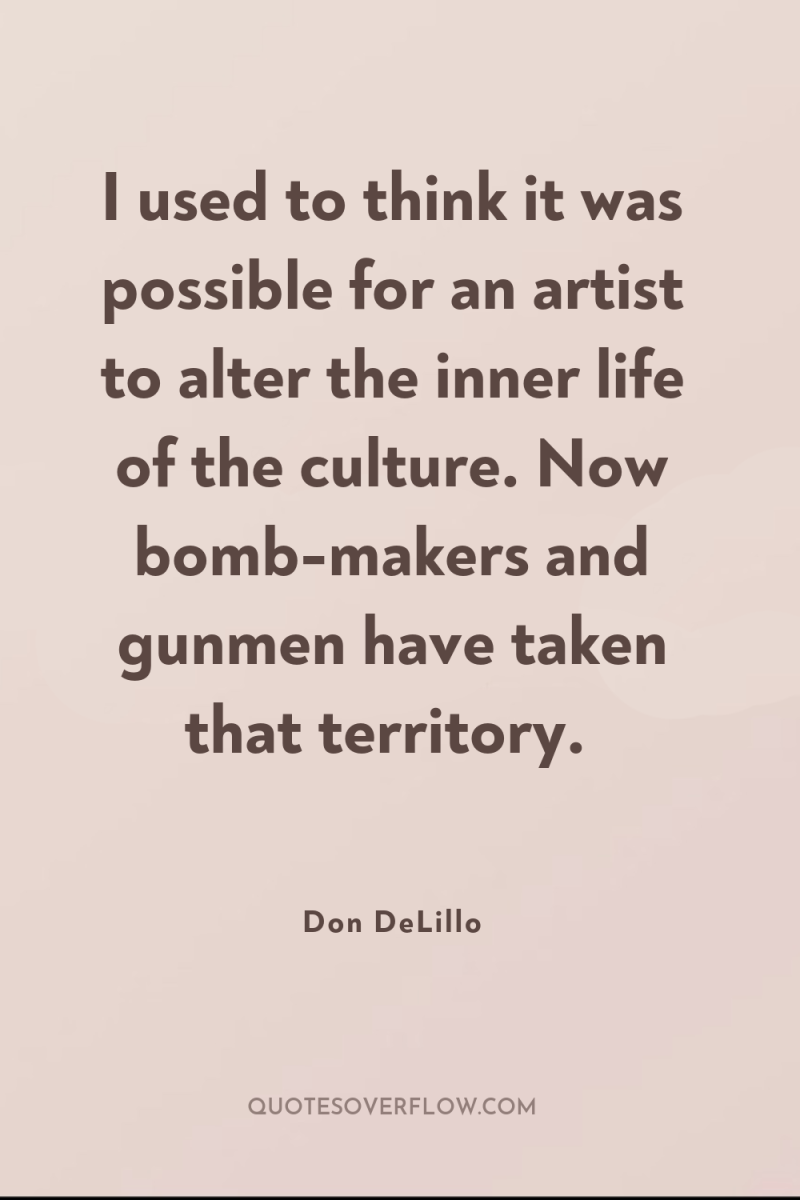
21
I used to think it was possible for an artist to alter the inner life of the culture. Now bomb-makers and gunmen have taken that territory.Don DeLillo

22
Too young for Korea, too old for Vietnam.Don DeLillo
23
All plots tend to move deathward. This is the nature of plots. Political plots, terrorist plots, lovers’ plots, narrative plots, plots that are part of children’s games. We edge nearer death every time we plot. It is like a contract that all must sign, the plotters as well as those who are the targets of the plot.Don DeLillo
24
It is the form that allows a writer the greatest opportunity to explore human experience.. For that reason, reading a novel is potentially a significant act. Because there are so many varieties of human experience, so many kinds of interaction between humans, and so many ways of creating patterns in the novel that can’t be created in a short story, a play, a poem or a movie. The novel, simply, offers more opportunities for a reader to understand the world better, including the world of artistic creation. That sounds pretty grand, but I think it’s true.Don DeLillo
25
The painted aircraft took on sunlight and pulse. Sweeps of color, bands and spatters, airy washes, the force of saturated light–the whole thing oddly personal, a sense of one painter’s hand moved by impulse and afterthought as much as by epic design. I hadn’t expected to register such pleasure and sensation. The air was color-scrubbed, coppers and ochers burning off the metal skin of the aircraft to exchange with the framing desert. .Don DeLillo
26
I'm completely aware of Matisse and what he said, that painters must begin by cutting out their tongues.Don DeLillo
27
I was too much of a Bronx kid to read Emerson or Hawthorne.Don DeLillo
28
A photograph is a universe of dots. The grain, the halide, the little silver things clumped in the emulsion. Once you get inside a dot, you gain access to hidden information, you slide into the smallest event. This is what technology does. It peels back the shadows and redeems the dazed and rumbling past. It makes reality come true.Don DeLillo
29
I'd never felt more human than I did when my mother lay in bed, dying. This was not the frailty of a man who is said to be "only human, " subject to a weakness or a vulnerability. This was a wave of sadness and loss that made me understand that I was a man expanded by grief.Don DeLillo
30
Money was spiritual indemnity against some unspecifiable future loss. It existed in purest form in his mind, my money, a reinforcing source of meditation.Don DeLillo
31
How language is webbed in the senses. Out of sand-blazed brilliance into quirky minds such as his, into touch, taste and fragrance. He thought he'd linger just a bit longer, let the bath take total hold, ease and alleviate, before he put on clothes and entered the complex boxes where people do their living. Nothing fits the body so well as water.Don DeLillo
32
As always when he worked with this much concentration he began to feel a sense of introverting pressure. There was no way out once he was in, no genuine rest, no one to talk to who was capable of understanding the complexity (simplicity) of the problem or the approaches to a tentative solution. There came a time in every prolonged effort when he had a moment of near panic, or "terror in a lonely place, " the original semantic content of the word. The lonely place was his own mind. As a mathematician he was free from subjection to reality, free to impose his ideas and designs on his own test environment. The only valid standard for his work, its critical point (zero or infinity), was the beauty it possessed, the deft strength of his mathematical reasoning. THe work's ultimate value was simply what it revealed about the nature of his intellect. What was at stake, in effect, was his own principle of intelligence or individual consciousness; his identity, in short. This was the infalling trap, the source of art's private involvement with obsession and despair, neither more nor less than the artist's self-containment, a mental state that led to storms of overwork and extended stretches of depression, that brought on indifference to life and at times the need to regurgitate it, to seek the level of expelled matter. Of course, the sense at the end of a serious effort, if the end is reached successfully, is one of lyrical exhilaration. There is air to breathe and a place to stand. The work gradually reveals its attachment to the charged particles of other minds, men now historical, the rediscovered dead; to the main structure of mathematical thought; perhaps even to reality itself, the so-called sum of things. It is possible to stand in time's pinewood dust and admire one's own veronicas and pavanes. .Don DeLillo
33
My son used to believe that he could look at a plane in flight and make it explode in midair by simply thinking it. He believed, at thirteen, that the border between himself and the world was thin and porous enough to allow him to affect the course of events. An aircraft in flight was a provocation too strong to ignore. He’d watch a plane gaining altitude after taking off from Sky Harbor and he’d sense an element of catastrophe tacit in the very fact of a flying object filled with people. He was sensitive to the most incidental stimulus and he thought he could feel the object itself yearning to burst. All he had to do was wish the fiery image into his mind and the plane would ignite and shatter. His sister used to tell him, Go ahead, blow it up, let me see you take that plane out of the sky with all two hundred people aboard, and it scared him to hear someone talk this way and it scared her too because she wasn’t completely convinced he could not do it. It’s the special skill of an adolescent to imagine the end of the world as an adjunct to his own discontent. But Jeff got older and lost interest and conviction. He lost the paradoxical gift for being separate and alone and yet intimately connected, mind-wired to distant things. .Don DeLillo
34
How children adapt to available surfaces, using curbstones, stoops and manhole covers. How they take the pockmarked world and turn a delicate inversion, making something brainy and rule-bound and smooth, and then spend the rest of their lives trying to repeat the process.Don DeLillo
35
Make no mistake. I take these children seriously. It is not possible to see too much in them, to overindulge your causal gift for the study of character. It is all there, in full force, charged waves of identity and being. There are no amateurs in the world of childrenDon DeLillo
36
Once out of the mailroom, I began to learn more about fear. As soonas fear begins to ascend, anatomically, from the pit of the stomach to thethroat and brain, from fear of violence to the more nameless kind, youcome to believe you are part of a horrible experiment. I learned todistrust those superiors who encouraged independent thinking. When yougave it to them, they returned it in the form of terror, for they knewthat ideas, only that, could hasten their obsolescence. Management askedfor new ideas all the time; memos circulated down the echelons, requestingbold and challenging concepts. But I learned that new ideas could finishyou unless you wrapped them in a plastic bag. I learned that most of thesecretaries were more intelligent than most of the executives and that theexecutive secretaries were to be feared more than anyone. I learned whatclosed doors meant and that friendship was not negotiable currency and howimportant it was to lie even when there was no need to lie. Words andmeanings were at odds. Words did not say what was being said nor even itsreverse. I learned to speak a new language and soon mastered the specialelements of that tongue.Don DeLillo
37
California deserves whatever it gets. Californians invented the concept of life-style. This alone warrants their doom.Don DeLillo
38
Then they’re always trying to sell you something. Everything is based on forcing people to buy. If you can’t buy what they’re selling, you’re a zero in the system.Don DeLillo
39
Everything was fine, would continue to be fine, would eventually get even better as long as the supermarket did not slip.Don DeLillo
40
Cities were built to measure time, to remove time from nature. There’s an endless counting down, he said. When you strip away all the surfaces, when you see into it, what’s left is terror. This is the thing that literature was meant to cure.Don DeLillo
41
I drove all night, northeast, and once again I felt it was literature I had been confronting these past days, the archetypes of the dismal mystery, sons and daughters of the archetypes, images that could not be certain which of two confusions held less terror, their own or what their own might become if it ever faced the truth. I drove at insane speeds.Don DeLillo
42
And you can glance out the window for a moment, distracted by the sound of small kids playing a made-up game in a neighbor's yard, some kind of kickball maybe, and they speak in your voice, or piggyback races on the weedy lawn, and it's your voice you hear, essentially, under the glimmerglass sky, and you look at the things in the room, offscreen, unwebbed, the tissued grain of the deskwood alive in light, the thick lived tenor of things, the argument of things to be seen and eaten, the apple core going sepia in the lunch tray, and the dense measures of experience in a random glance, the monk's candle reflected in the slope of the phone, hours marked in Roman numerals, and the glaze of the wax, and the curl of the braided wick, and the chipped rim of the mug that holds your yellow pencils, skewed all crazy, and the plied lives of the simplest surface, the slabbed butter melting on the crumbled bun, and the yellow of the yellow of the pencils, and you try to imagine the word on the screen becoming a thing in the world, taking all its meanings, its sense of serenities and contentments out into the streets somehow, its whisper of reconciliation, a word extending itself ever outward, the tone of agreement or treaty, the tone of repose, the sense of mollifying silence, the tone of hail and farewell, a word that carries the sunlit ardor of an object deep in drenching noon, the argument of binding touch, but it's only a sequence of pulses on a dullish screen and all it can do is make you pensive--a word that spreads a longing through the raw sprawl of the city and out across the dreaming bournes and orchards to the solitary hills. Peace.Don DeLillo
43
There are dead stars that still shine because their light is trapped in time. Where do I stand in this light, which does not strictly exist?Don DeLillo
44
Only absences were fully shared.Don DeLillo
45
Why shouldn't his death bring you into some total scandal of garment-rending grief? Why should you accommodate his death? Or surrender to it in thin-lipped tasteful bereavement? Why give him up if you can walk along the hall and find a way to place him within reach? Sink lower, she thought. Let it bring you down. Go where it takes you.Don DeLillo
46
I like simple men and complicated women.Don DeLillo
47
Think of the great poetry, the music and dance and ritual that spring forth from our aspiring to a life beyond death. Maybe these things are justification enough for our hopes and dreams, although I wouldn't say that to a dying man.Don DeLillo
48
Memory is the faculty of absolution. Men developed memories to ease their disquiet over things they did as men. The deep past is the only innocence and therefore necessary to retain.Don DeLillo
49
What you see is not what wee se. What you see is distracted by memory, by being who you are, all this time, for all these years.Don DeLillo
50
Air travel reminds us who we are. It’s the means by which we recognize ourselves as modern. The process removes us from the world and sets us apart from each other. We wander in the ambient noise, checking one more time for the flight coupon, the boarding pass, the visa. The process convinces us that at any moment we may have to submit to the force that is implied in all this, the unknown authority behind it, behind the categories, the languages we don’t understand. This vast terminal has been erected to examine souls.Don DeLillo
51
When my head is in the typewriter the last thing on my mind is some imaginary reader. I don’t have an audience; I have a set of standards. But when I think of my work out in the world, written and published, I like to imagine it’s being read by some stranger somewhere who doesn’t have anyone around him to talk to about books and writing–maybe a would-be writer, maybe a little lonely, who depends on a certain kind of writing to make him feel more comfortable in the world.Don DeLillo
52
This happened back east of course. I've heard that term a lot since coming to this part of the country. But I never think of the term as a marker of geography. It's a reference to time, a statement about time, about all the densities of being and experience, it's time disguised, it's light-up time, shifting smoky time tricked out as some locus of stable arrangement. When people use that term they're talking about the way things used to be before they moved out here, the way the world used to be, not just New Jersey or South Philly, or before their parents moved, or grandparents, and about the way things still exist in some private relativity theory, some smoky shifting mind dimension, or before the other men and women came this way, the ones in Conestoga wagons, a term we learned in grade school, a back-east term, stemming from the place where the wagons were made. (pg.333) .Don DeLillo
53
Be willing to die for your beliefs, or computer printouts of your beliefs.Don DeLillo
54
Everybody wants to own the end of the world.Don DeLillo
55
He was a regulator first-class, which was another term for metalworker unskilled.Don DeLillo
56
The letters released something, maybe a sense that he was not alone, that the world was a place where travelers in language could know the same things.Don DeLillo
57
I am the false character that follows the name around.Don DeLillo
58
All that incoherence. Selection, election, option, alternative. All behind him now. Codes and formats. Courses of action. Values, bias, predilection. Choice is a subtle form of disease.Don DeLillo
59
We feel a private thrill, admit it, at the sight of beauty in flames. We wish to blast all the fine old things to oblivion and replace them with tasteless identicalstructures.Don DeLillo
60
God made big people. And God made little people. But Colt made the .45 to even things up.Don DeLillo
61
A naked woman was amazing. He'd never seen it this way, in full light, without half-off clothes or a beach blanket across the lap or sex in a dark car. This was her whole body naked in light, standing and lying and front and back and open and showing and then different when she walked, surer than he was, unclunky and smooth-moving, with parts that didn't bounce. She knew how to be naked. She looked like she'd been raised naked in this room, a skinny girl when she was a girl, probably, and skinny in a certain way, with a little bulgy belly and ashamed of her feet, but grown out of shyness and wrong proportions now, and being married of course, used to being seen, and she didn't have curves and swerves but was good looking naked and stuck to him when they fucked like a thing fighting for light, a great wet papery moth.Don DeLillo
62
People get bitten. But I won't.' I found myself saying, 'You will, you will. These snakes don't know you find death inconceivable. They don't know you're young and strong and you think death applies to everyone but you. They will bite you and you will die.Don DeLillo
63
How I would enjoy being told the novel is dead. How liberating to work in the margins, outside a central perception. You are the ghoul of literature.Don DeLillo
64
Man’s guilt in history and in the tides of his own blood has been complicated by technology, the daily seeping falsehearted death.Don DeLillo
65
We drove 22 miles into the country around Farmington. There were meadows and apple orchards. White fences trailed through the rolling fields. Soon the sign started appearing. THE MOST PHOTOGRAPHED BARN IN AMERICA. We counted five signs before we reached the site. There were 40 cars and a tour bus in the makeshift lot. We walked along a cowpath to the slightly elevated spot set aside for viewing and photographing. All the people had cameras; some had tripods, telephoto lenses, filter kits. A man in a booth sold postcards and slides -- pictures of the barn taken from the elevated spot. We stood near a grove of trees and watched the photographers. Murray maintained a prolonged silence, occasionally scrawling some notes in a little book. "No one sees the barn, " he said finally. A long silence followed. "Once you've seen the signs about the barn, it becomes impossible to see the barn." He fell silent once more. People with cameras left the elevated site, replaced by others. We're not here to capture an image, we're here to maintain one. Every photograph reinforces the aura. Can you feel it, Jack? An accumulation of nameless energies." There was an extended silence. The man in the booth sold postcards and slides. "Being here is a kind of spiritual surrender. We see only what the others see. The thousands who were here in the past, those who will come in the future. We've agreed to be part of a collective perception. It literally colors our vision. A religious experience in a way, like all tourism." Another silence ensued. "They are taking pictures of taking pictures, " he said.Don DeLillo
66
A writer takes earnest measures to secure his solitude and then finds endless ways to squander it.Don DeLillo
67
It was uncanny. You press a button and a man drops dead a hundred meters away. It seemed hollow and remote, falsifying everything. It was a trick of the lenses. The man is an accurate picture. Then he is upside down. Then he is right side up. You shoot at a series of images conveyed to you through a metal tube. The force of a death should be enormous but how can you know what kind of man you’ve killed or who was the braver and stronger if you have to peer through layers of glass that deliver the image but obscure the meaning of the act? War has a conscience or it’s ordinary murder.Don DeLillo
68
This is the whole point of technology. It creates an appetite for immortality on the one hand. It threatens universal extinction on the other. Technology is lust removed from nature. - Murray (WN 285)Don DeLillo
69
As technology advances in complexity and scope, fear becomes more primitive.Don DeLillo
70
Technology is crucial to civilization why? Because it helps us make our fate. We don't need God or miracles or the flight of the bumble bee. But it is also crouched and undecidable. It can go either way.Don DeLillo
71
You could put your faith in technology. It got you here, it can get you out" - Murray (WN 285).Don DeLillo
72
You shout because it makes you brave or you want to announce your recklessness.Don DeLillo
73
You know what capitalism produces. According to Marx and Engels.""Its own grave-diggers, " he said." But these are not the grave-diggers. This is the free market itself. These people are a fantasy generated by the market. They don't exist outside the market. There is nowhere they can go to be on the outside. There is no outside." The camera tracked a cop chasing a young man through the crowd, an image that seemed to exist at some drifting distance from the moment." The market culture is total. It breeds these men and women. They are necessary to the system they despise. They give it energy and definition. They are market-driven. They are traded on the markets of the world. This is why they exist, to invigorate and perpetuate the system. .Don DeLillo
74
Doesn't seem quite real. It's not meaningful. I can't quite imagine myself being 73. That's the age my father was! [Laughter.] How can I be his age? It's weird.Don DeLillo
75
He wanted to fuck her loudly on a hard bed with rain beating on the windows.Don DeLillo
76
You need to know things the others don't know. It's what no one knows about you that allows you to know yourself.Don DeLillo
77
Secrets are an exalted state, almost a dream state. They're a way of arresting motion, stopping the world so we can see ourselves in it.Don DeLillo
78
Steffie took my hand and we walked past the fruit bins, an area that extended about forty-five yards along one wall. The bins were arranged diagonally and backed my mirrors that people accidentally punched when reaching for fruit in upper rows.Don DeLillo
79
Brilliant people never think of the lives they smash, being brilliant.Don DeLillo
80
Would you ask a man who bags groceries if he fears death not because it is death but because there are still some interesting groceries he would like to bag?Don DeLillo
81
If you could stretch a given minute, what would you find between its unstuck components? Probably some kind of astral madness. A bleak comprehension of the final size of things.Don DeLillo
82
Do you know why I believe in the novel? It’s a democratic shout. Anybody can write a great novel, one great novel, almost any amateur off the street. I believe this, George. Some nameless drudge, some desperado with barely a nurtured dream can sit down and find his voice and luck out and do it. Something so angelic it makes your jaw hang open. The spray of talent, the spray of ideas. One thing unlike another, one voice unlike the next. Ambiguities, contradictions, whispers, hints. And this is what you want to destroy.Don DeLillo
83
When a writer doesn’t show his face, he becomes a local symptom of God’s famous reluctance to appear.Don DeLillo
84
There were no laptops or handheld devices in class. Ilgauskas didn't exclude them; we did, sort of, unspokenly. Some of us could barely complete a thought without touch pads or scroll buttons, but we understood that high-speed data systems did not belong here. They were an assault on the environment, which was defined by length, width, and depth, with time drawn out, computed in heartbeats.Don DeLillo
85
Why are free spirits always so fucking dumb?Don DeLillo
86
What was the barn like before it was photographed?' he said. 'What did it look like, how was it different from other barns, how was it similar to other barns? We can't answer these questions because we've read the signs, seen the people snapping the pictures. We can't get outside the aura. We're part of the aura. We're here, we're now.Don DeLillo
87
I have only a bare working knowledge of the human brain but it's enough to make me proud to be an American.Don DeLillo
88
When birds look into houses, what impossible worlds they see.Don DeLillo
89
That's why he was here, to surrender himself to longing, to listen to his host recite the anecdotal texts, all the passed-down stories of bonehead plays and swirling brawls, the pitching duels that carried into twilight, stories that Marvin had been collecting for half a century--the deep eros of memory that separates baseball from other sports.Don DeLillo
90
The thinness of contemporary life. I can poke my finger through it.Don DeLillo
91
Everything was on television last nightDon DeLillo
92
That's the world out there, little green apples and infectious disease.Don DeLillo
93
In the countryside he heard horns and drums and followed the sound to a temple of granite and marble set in a compound that included shrines and incense stalls, people squatting against the walls, beggars, touts, flower-sellers, those who watch over your shoes for a couple of weightless coins.Don DeLillo
94
This was the year he rode the subway to the ends of the city, two hundred miles of track.Don DeLillo
95
How many times do two people have to fuck before one of them deserves to die?" _Eric PackerDon DeLillo
96
Ordinary moments make the life. This is what she knew to be trustworthy and this is what I learned, eventually, from those years we spent together. No leaps or falls. I inhale the little drizzly details of the past and know who I am. What I failed to know before is clearer now, filtered up through time, an experience belonging to no one else, not remotely, no one, anyone, ever. I watch her use the roller to remove lint from her cloth coat. Define coat, I tell myself. Define time, define space.Don DeLillo
97
The vast and terrible depth."“ Of course, ” he said.“ The inexhaustibility.”“ I understand.”“ The whole huge nameless thing.”“ Yes, absolutely.”“ The massive darkness.”“ Certainly, certainly.”“ The whole terrible endless hugeness.”“ I know exactly what you mean.Don DeLillo
98
She was a voice with a body as afterthought, a wry smile that sailed through heavy traffic. Give her a history and she'd disappear. Eric Packer about Vija KinskiDon DeLillo
99
Eye contact was a delicate matter. A quarter second of a shared glance was a violation of agreements that made the city operational.Don DeLillo
100
The view is endlessly fulfilling. It is like the answer to a lifetime of questions and vague cravings.Don DeLillo